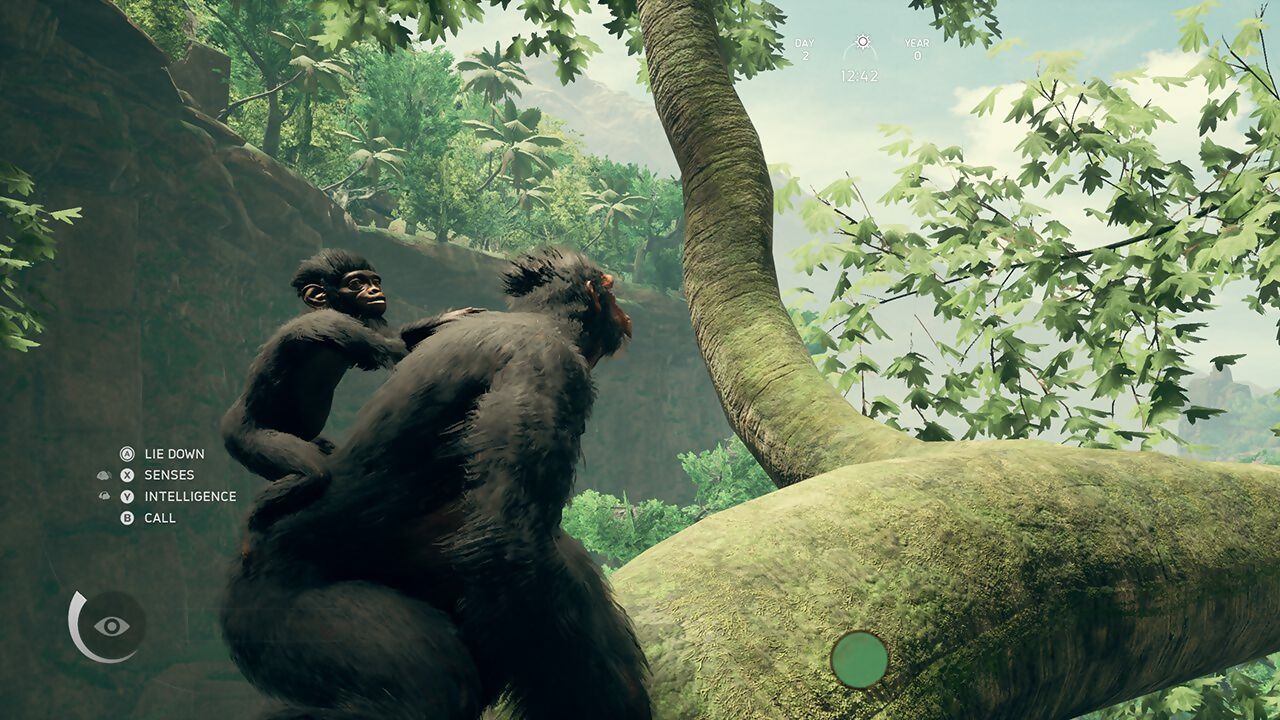
A fascinating premise is marred by repetition and weird design choices. Our review of Ancestors: The Humankind Odyssey…
The beginning hours of Ancestors: The Humankind Odyssey are filled with promise and intrigue. The first game from Panache Digital Games, headed up by Patrice Désilets – best known for creating the Assassin’s Creed series – takes place ten million years in the past, putting you in the primitive body of an early hominid.
It’s a fascinating premise for a video game, revolving around humanity’s evolution from early apes to something more closely resembling humankind, whether you’re gradually learning how to walk on two legs or discovering how to craft spears to defend against the myriad predators stalking the African continent.
Beyond those first few hours, however, I spent the rest of my time with Ancestors just waiting and hoping for it to evolve in some way (if you can pardon the pun).
Your long-term goal is to advance the species and ensure your clan’s lineage by surviving across eight million years. What this boils down to on a moment-to-moment basis is relatively simple: you’ll venture out into the wilderness, discover your surroundings, and find ways to use tools and the local flora in order to survive.
It’s a similar structure to other survival games of recent years, except Ancestors is so incredibly opaque that much of your time is spent trying to figure out what you’re supposed to be doing and how you’re supposed to do it. This makes sense conceptually, considering you’re in the body of a protohuman discovering the world for the first time, but it doesn’t take long before the whole game descends into a monotonous grind of repetition and frustration.
Take the routine discovery of objects in the environment as an example. This is done by using different senses to examine your surroundings, but the act of doing so quickly becomes a laborious test of patience.
Each time you opt to use one of your senses to uncover the various plants, water sources, and other animals lurking amidst the jungles, swamps, and savannahs of Africa, you have to come to a complete stop and spend time hovering over a surfeit of icons that appear on the screen. If you find something foreign, you need to pick it up and examine it to reveal its true identity and potential purpose.
Initially, this taps into an inherent sense of discovery as you spend time uncovering the numerous food sources and tools within close proximity and figure out how to combine them, but it doesn’t take long before this turns into another repetitive task to tick off on a checklist of increasingly repetitive tasks.
There’s a lot of tedious stopping and moving, and the slow process of uncovering everything is only exacerbated when you’re injured and in desperate need of a particular plant to heal yourself.
And believe me when I say you’ll be injured a lot in Ancestors. Almost every surface is climbable, whether you’re scaling a sheer cliff face or scurrying up a towering tree. Désilets’ background designing Assassin’s Creed is evident in the way you climb and move through the trees, yet traversal isn’t as intuitive as I had hoped.
Climbing is fine, but navigating amongst the branches is overly cumbersome, and there’s no easy way to climb down beyond jumping to other surfaces. Think back to Assassin’s Creed 3 and the way the position of trees was contrived so you could quickly move from one to the next without missing a beat. In Ancestors, the formation of trees is much more natural, but this means the distance between them isn’t always conducive to free-flowing platforming.
I can’t count the number of times I had to take a leap of faith only to fall 50 feet and break a bone for the umpteenth time. Movement is already lethargic without a leg injury slowing you down to a crawl.
Despite the perils of falling, trees do provide a measure of safety compared to what’s prowling on ground level. Giant snakes, crocodiles, and big cats are just a few of the animals with hunger pangs for a slice of ape flesh.
There’s a tangible sense of peril and vulnerability when you’re on the ground, especially when you’re helpless to fight back against all the things trying to eat you. Eventually, you might learn how to craft a spear, but this is another part of the Ancestors learning process. The game tells you absolutely nothing beyond the basic controls.
Some of the ‘shoulds’ and ‘should nots’ are common knowledge, like don’t drink from a standing water source, and probably don’t stuff those mushrooms down your gullet. Others, like figuring out how to sharpen a stick or open a coconut, aren’t as obvious as they maybe should be, but there’s a definite thrill that comes from learning how to use and combine the various tools.
Ancestors has some great moments like this in isolation, such as the first time you pierce a spear through one of your predators’ skulls, or clamber up the majestic world tree – but they’re fleeting and punctuated by sheer tedium.
The UI and skill tree are at odds with the primitive game wrapped around them, focusing on evolution like you’re sat in a science lesson as opposed to inhabiting an ape. New skills range from learning how to pass items from one hand to the other and increasing the range of your senses.
Unlock enough of these and you can advance time by a single generation or leap forwards hundreds of thousands of years. When you do this, you can only take a couple of your learned skills with you, and if your whole clan dies, you lose everything, which forces you to go back and relearn every skill you had on top of discovering each plant, rock, and predator all over again.
Whether you progress through time or lose everything, the game doubles down on being a major drag that could’ve really used some kind of persistence.
As it is, Ancestors’ novel premise isn’t enough to stave off the repetitive, dull, and unstructured game wrapped around it.
Highlight
I once decided to make my whole clan follow me out into the jungle. Surely our sheer numbers would intimidate any predators, right? Wrong. Watching my clan of apes struggle to work out how to run away from a giant cat eating their mates would’ve been funny if it wasn’t so disheartening.
Verdict: 40%
Ancestors’ fascinating premise gets bogged down by a repetitive game of tedious survival.
Genre: Survival
Format: PC
Developer: Panache Digital Games
Publisher: Private Division
Price: £32.99
Release: Out now





